
The open-world RPG is by no means a neglected genre – the last decade has seen major titles arrive at a steady pace from developers in the US, Europe and Japan, ranging from high fantasy to sci-fi, to post-apocalyptic and all things in-between. It’s a populous market which isn’t in dire need of more games. As such, it must have been an intimidating genre for debutant Czech developers Warhorse Studios to plunge headlong into, particularly with a title as ambitious as Kingdom Come: Deliverance.

With a focus on realism in setting and gameplay, Warhorse set out to strip away much of the elaborate finery to be found in the modern RPG. In place of spells, runic weapons and ghostly spirit realms, KC:D offers a complex and interconnected web of systems that require you to consider your every action, from eating and bathing to exhaustingly rehearsing swordplay techniques in order to progress in your adventure.
Set in Medieval Bohemia, which equates to the modern-day Czech Republic, KC:D puts you in the shoes of a peasant villager, Henry. A typical young man, Henry drinks too much, sleeps in too late and disappoints his father, the local blacksmith. When war comes to Henry’s home village of Skalitz, he is tossed unprepared into dangers he once could not have fathomed and must summon all of his resourcefulness to survive and progress in a world that has no use for him.
What follows is a relatively simple but emotive tale that pulls the player from village to town and castle, into dungeons, apothecaries and woodland camps, meeting mercenaries, nobles and drunkard priests in Henry’s quest for justice. The scenario writing is fairly vanilla, as you’d expect from a title steeped in historical realism, but the dialogue is stellar; subtle and understated when it needs to be, yet at times bold and hilarious in a way not often seen outside of a Grand Theft Auto.
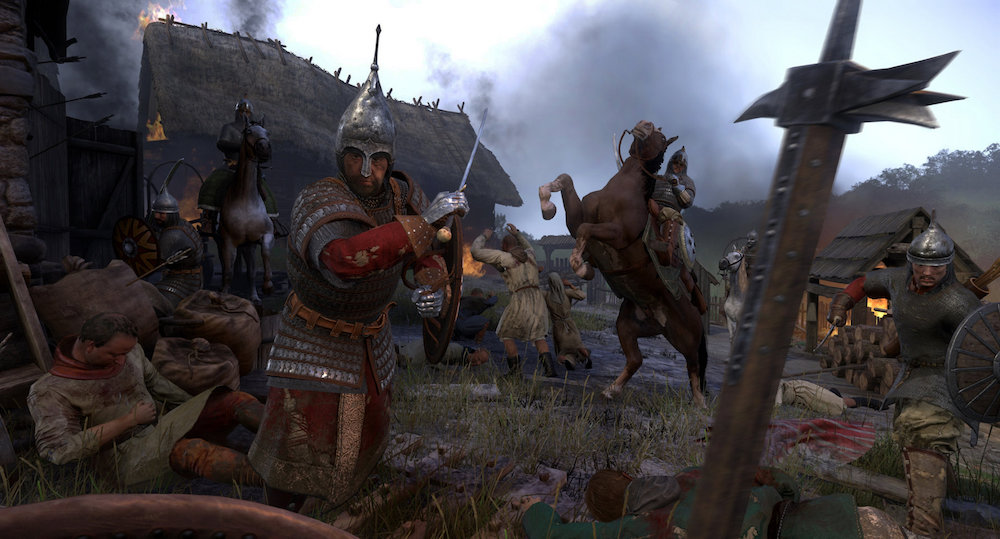
Accompanying the excellent script is an array of top-tier voice acting and mo-cap performances, which bring a degree of life and believability not often seen in games with this many lines and scenes to capture. Outside of cutscenes, the animation of some NPC actions is a little underwhelming, but not out of line with what we’d expect from an open world game with thousands of individually scheduled characters. Voice and face repetition still exists, but is fleeting, and is certainly forgivable from a fledgling development team.
Visually, KC:D continues to amaze hour after hour and session after session. Warhorse has put CryEngine to fantastic use, and have matched its technical capabilities with a stunning, period-appropriate art style that brings gritty life to the world that Henry occupies. Texture quality is a little lacking in parts, but this is made up for by brilliant lighting, both inside and out, that sees gorgeous, natural features stand out against the bleak, cold, Bohemian fog.
The meat of KC:D comes in its role-playing systems, which are subtle on their own but combine into a near-realistic simulation of the campaign from peasant to soldier. Henry must eat and sleep in a regular cycle, lest he suffer the detriments of starvation or overtiredness, but the quality of the food and bed he sleeps on will impact his rejuvenation. Likewise, the essential function of bathing is present, and the cleanliness of Henry’s body and clothes will greatly influence who will speak to him, and how.
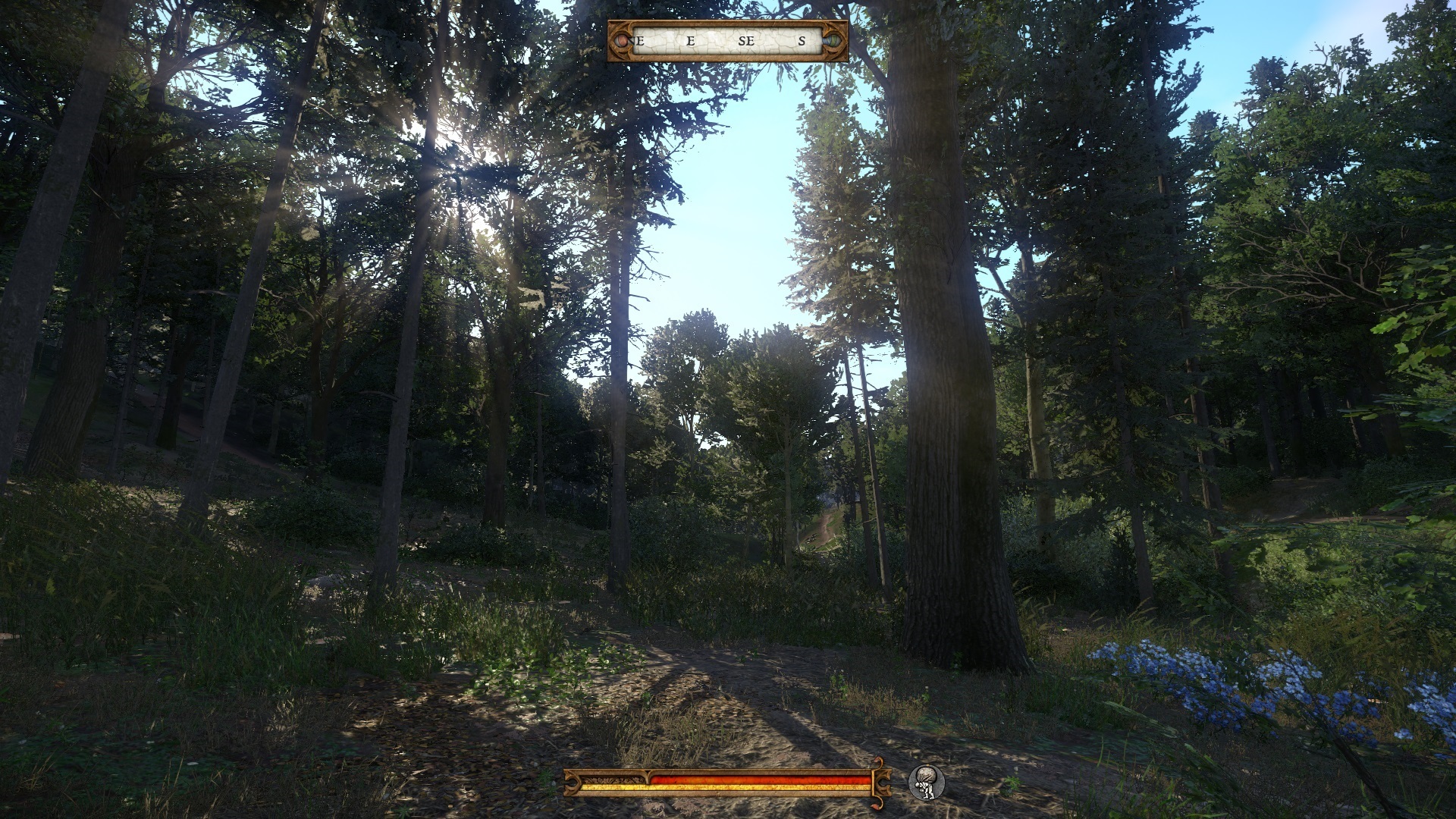
An excellent example of KC:D’s entwined activities comes in my process of learning to brew a potion. I found and gathered a few herbs on the roadside. When next in town, I headed to the herbalist’s shop and politely asked to use his brewing station. But where were all the potions to choose from? I needed a recipe, which I promptly bought from the herbalist and returned to the brewing station. Oh, I still have to carry out each step? But, the recipe is gibberish. It dawned on me; I am the peasant son of a village blacksmith, and I cannot read.
So, I enquired with the local bailiff as to where I might be able to learn to read. He advised that there was a scribe working in a nearby village who could teach me the basics, so I travelled there and learned all I could. Still, some words were a little jumbled, but the more books I read, the less jumbled the words became, until, after some time, I was able to make out sentences.
Back at the brewing station, I was now armed with the herbs and the ability to read instructions. So, I manually poured water into the cauldron, dropped a handful of nettle in and brought it to the boil. I pestled two handfuls of belladonna, dumped them into a spare bowl, and waited for the nettle to finish boiling. Adding the belladonna to the mixture, I brought it all to the boil one more time, before pouring the mixture into a phial. At last, I had brewed my first batch of Saviour Schnapps, the in-game item required to save your progress. It’s quite an involved process, isn’t it?
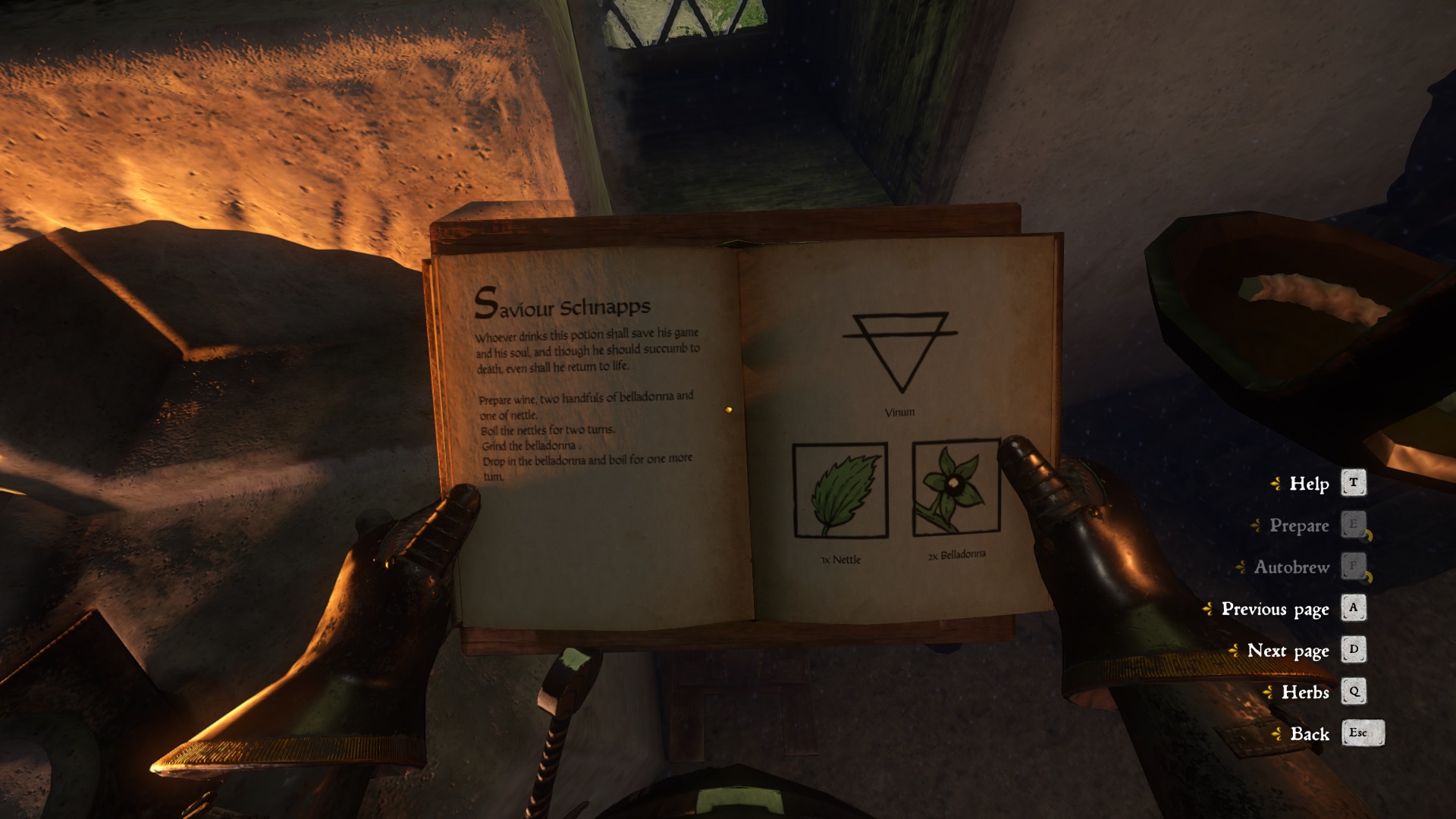
Repair your own armour and have it fit like a glove, making less noise when you move. Grab a bowl of stew from the soldier’s camp on the way out of town, so that if trouble should find you on the road, at least your stomach won’t be empty. Practice your dodging with the guard captain, because that blow to the head almost got you killed yesterday. Once you’ve grasped the game’s many mechanics, you’ll begin to make these decisions organically. In a wonderful throwback to the actual role-playing games of yesteryear, KC:D is less about non-stop combat and more about your step-by-step journey through this adventure.
One requirement of building such a complex game is that its mechanics need to be clearly explained to the player so that they can get the most out of them. This is one area in which Warhorse has fallen a little flat. Some things, such as lockpicking and pickpocketing, are so poorly explained that they must be learned through a tedious process of trial and error. There are, in fact, elements of the pickpocketing UI that the internet has decided are superfluous, despite looking like they’re communicating information to you.
Likewise, quest design is fairly inconsistent and poorly communicated. Some quests, for example, have strict time limits, while others do not, but you’re given no way of telling which are which. It’s not even intuitive. One quest to gather “tomorrow at dawn” for a hunting journey can be left indefinitely and completed after any number of days, while a quest to ask the local priest about a potion to cure insomnia has an arbitrary time limit.
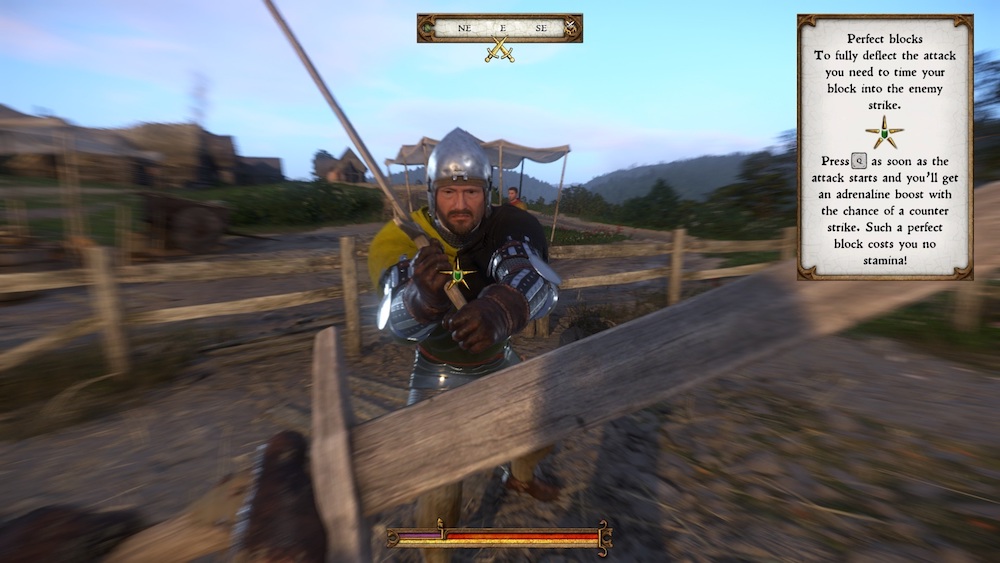
Aside from that, there are numerous game breaking bugs that still exist a month after release. So, when you randomly fail a quest or are unable to complete one, it’s hard to know if you’ve made a mistake, if the game hasn’t communicated something properly, or if there’s simply a bug that’s outside of your control. Couple that uncertainty with the fact that opportunities to save are few and far between (until you can farm the required Saviour Schnapps), and you’ve got a recipe for deep frustration and hours of wasted gameplay. Here’s hoping that the patches keep coming as regularly as they have been, so that the glitches are resolved, at the very least.
Combat comes close to last in this review, as it does in KC:D. Warhorse has developed a unique system that relies on angles of attack and the precise timing of blocks and swings, which takes plenty of getting used to but shines once mastered. It’s realistic in the sense that you can handle an opponent one-on-one, but things start getting hard to handle once there are two or more targets, as I imagine they would in an actual sword fight. Another great element of this system is how the player learns alongside Henry. At first, not only do you barely understand the system, but Henry’s abilities with a weapon are almost non-existent. After more and more combat, though, both Henry’s understanding and your own will grow in unison, so that once you’re good enough to pre-empt the attack, Henry is quick enough to parry it. The experience of mastering swordplay in KC:D is ground-breaking.
This is cheapened somewhat by a sharp decline in difficulty in the mid-game. Once you’ve unlocked certain abilities, all but the most outnumbered encounters become a breeze. As well, it is possible to maneuver yourself in such a way that opponents essentially queue up in a straight line in front of you, and aren’t smart enough to surround you again as long as you keep moving. It’s an AI flaw that should’ve been tightened up if they wanted big fights to feel dangerous.
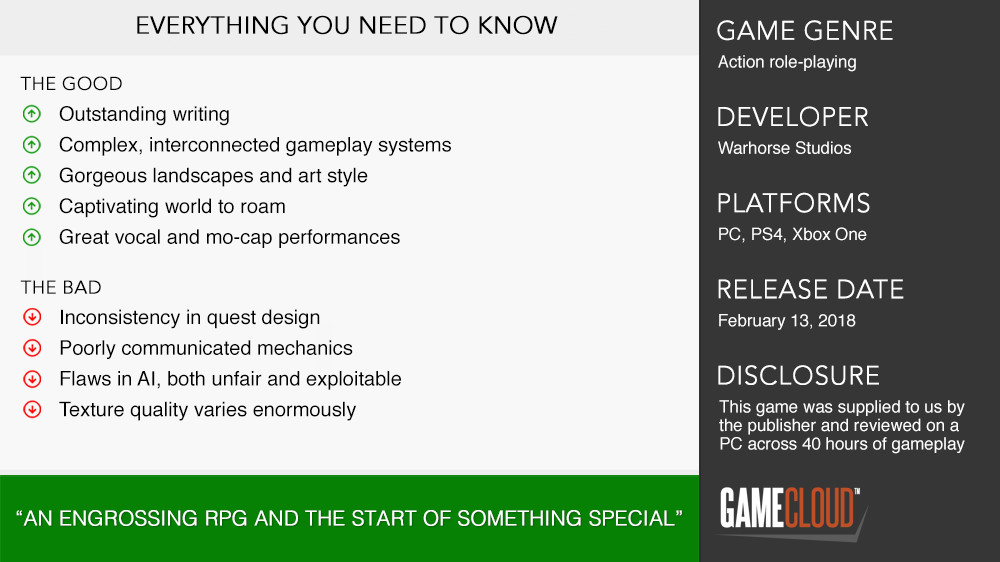
Kingdom Come: Deliverance is an enthralling RPG experience that deserves your full attention. It’s not a perfect game, but neither was The Witcher 1 and look where CD Projekt Red are now. Not only is Kingdom Come: Deliverance a game worth playing today, but I also hold strong hopes that, with a little trust and support, Warhorse Studios can blossom into the next role-playing juggernaut.











